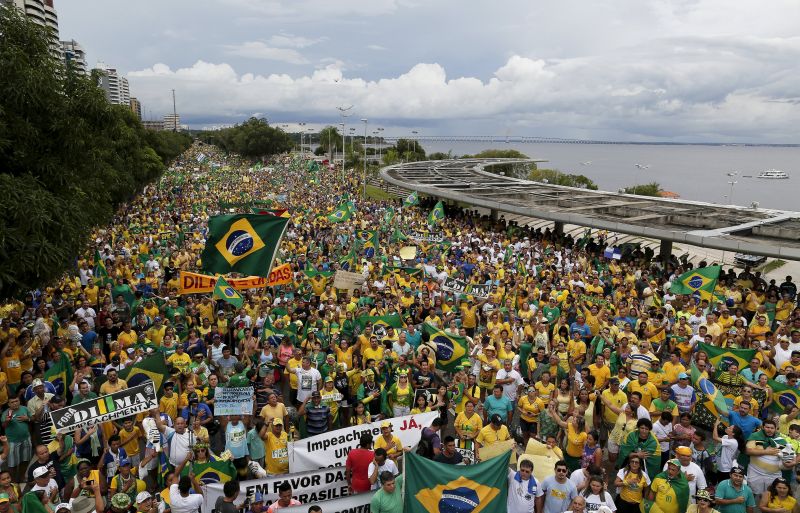 A ‘historic’ 1.4 million people in Sao Paulo fill the central avenue in a demonstration calling for the impeachment of president Dilma Rousseff. – Reuters pic, March 14, 2016.More than three million Brazilians, according to police, demonstrated yesterday across Latin America's biggest nation to demand the ouster of embattled President Dilma Rousseff.
A ‘historic’ 1.4 million people in Sao Paulo fill the central avenue in a demonstration calling for the impeachment of president Dilma Rousseff. – Reuters pic, March 14, 2016.More than three million Brazilians, according to police, demonstrated yesterday across Latin America's biggest nation to demand the ouster of embattled President Dilma Rousseff.
Chanting "Dilma out!" and draped in the bright yellow and green national flag, protesters across Brazil sought to pressure Congress into accelerating impeachment proceedings against the leftist leader, blamed for a massive corruption scandal and the worst economic recession in a quarter century.
"We are at a decisive moment for our country. We are going to start the change now," said Rogerio Chequer, leader of Vem Pra Rua, one of the main organisers of the demonstrations, at the Sao Paulo protest.
Helio Bicudo, a prominent lawyer who once supported the government but helped initiate the push for impeachment told the Sao Paulo protesters, "Brazil can't take being looted and robbed anymore, it can't take more incompetence and corruption."
A big turnout was likely to spur deputies in Congress who had been wavering over whether or not to drop support for the increasingly isolated president.
"This has been a very bad weekend for the government," said analyst Sergio Praca at the Getulio Vargas Foundation in Rio.
"The demonstrations were very powerful... It's the worst scenario possible for the government."
However, as after every large demonstration in this highly polarised country, there were sharply varying estimates of the numbers.
In Sao Paulo, the most populous city and an opposition stronghold, a sea of people filled the central avenue for a protest that state military police said drew a "historic" 1.4 million demonstrators.
On previous occasions, the military police have been accused of inflating numbers at anti-government protests.
Respected research centre Datafolha calculated that the total in Sao Paulo was only 500,000, although it said that even this would be a record number.
A national police count compiled by news site G1 found that some 1.3 million more protesters attended rallies at some 400 cities around Brazil, not counting Sao Paulo or a large demonstration in Rio de Janeiro.
Added together, the figures pointed to an overall turnout of around 3.5 million.
In Rio de Janeiro, which will host the Summer Olympics in August, protesters singing and dancing to samba songs swarmed along the beachfront avenue in Copacabana.
The turnout was impressive, but the organisers' claim that one million attended there appeared far-fetched. There was no police estimate for Rio.
Rousseff and her Workers' Party are struggling to hold on to power in the face of a probe into a massive bribes and embezzlement scandal at state oil company Petrobras.
Prosecutors' highest-profile target is Rousseff's key mentor in the Workers' Party, ex-president Luiz Inacio Lula da Silva.
Prosecutors have filed money laundering charges and requested he be put into preventative detention. Lula vigorously denies the allegations.
Rousseff is also presiding over a stinging recession, with the economy shrinking 3.8% last year and the country losing its investment grade credit ratings.
With divisions intensifying across the country, there had been fears of violence.
Many protesters held placards depicting Rousseff and Lula as prisoners, while others praised the chief investigating judge in the Petrobras scandal, Sergio Moro, as "Our national pride."
"I want Dilma's impeachment now," said Gaudino Inacio, 70, at the Sao Paulo demonstration.
"She's useless because she is unable to govern the country. After, we can have new elections." – AFP, March 14, 2016.

Comments
Please refrain from nicknames or comments of a racist, sexist, personal, vulgar or derogatory nature, or you may risk being blocked from commenting in our website. We encourage commenters to use their real names as their username. As comments are moderated, they may not appear immediately or even on the same day you posted them. We also reserve the right to delete off-topic comments